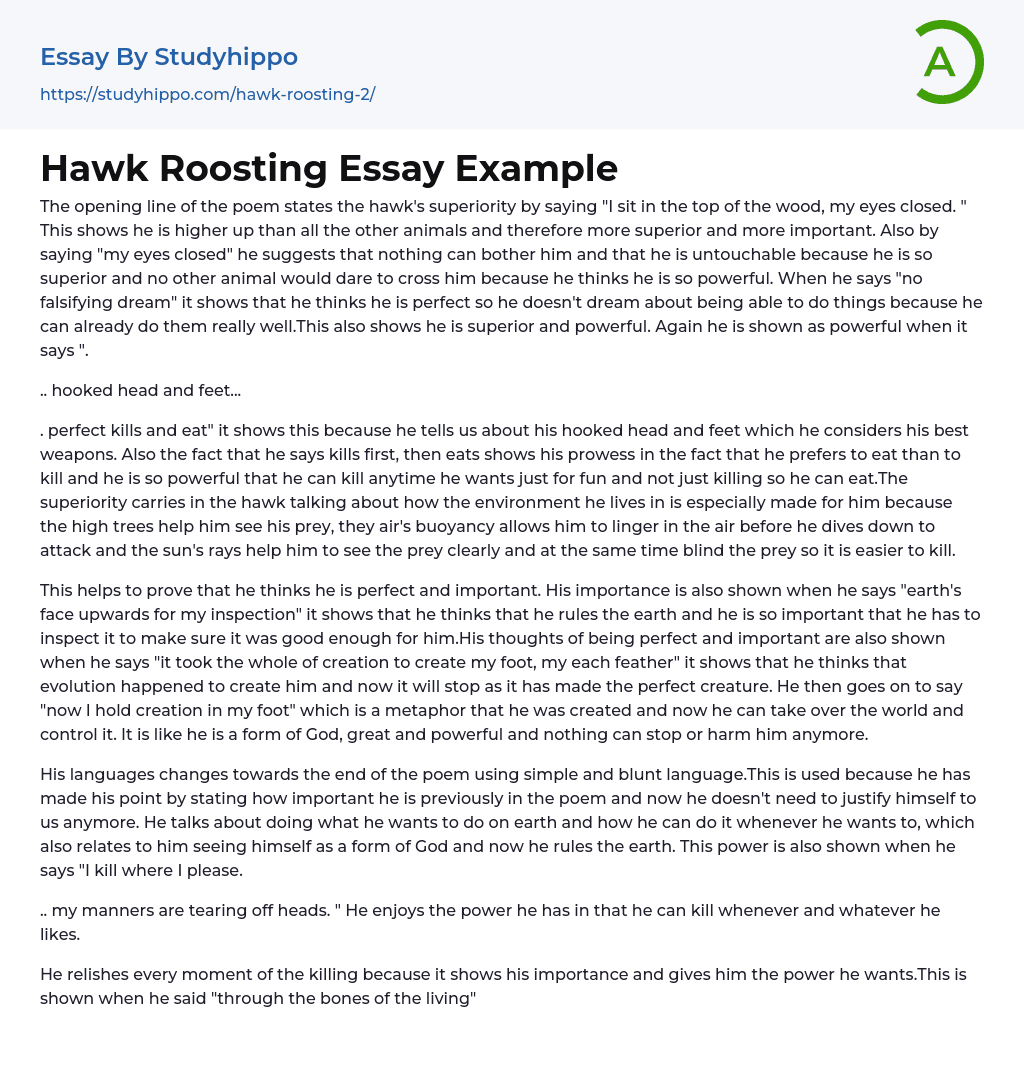In the poem, the hawk establishes its dominance and superiority over other animals by claiming to sit at the top of the wood, with closed eyes. This suggests that the hawk is unbothered and untouchable, as no other animal would dare to cross its power. The hawk's perfection is emphasized by mentioning that it does not dream about being better because it already can do things well. The repeated emphasis on the hawk's power underscores its position of superiority.
...attached by their heads and feet...
The text highlights the hawk's superior hunting skills, showcasing their perfected kills and strong preference for eating. The hawk's hooked head and feet are considered the bird's best weapons. The hawk is powerful enough to kill at any time for fun and not just for food. Additionally, the hawk thrives in its environment, where high trees assist in sp
...otting prey, the air's buoyancy allows for lingering before dives to attack, and the sun's rays assist in clear visibility while blinding prey.
The text suggests that the speaker views themselves as perfect and important. This is evident through their statement that they inspect the earth and see it as created for them. The individual believes that evolution has resulted in their creation and that they are now the epitome of perfection. They express this through the metaphor that they hold creation in their foot, indicating their power and control over the world. Essentially, the speaker sees themselves as god-like, invincible and indestructible.
Towards the end of the poem, the speaker's language shifts to become more straightforward and basic. This change is intentional, as he has already established his significance earlier in the poem an
no longer feels the need to explain himself to the reader. He discusses his ability to do as he pleases on earth, which further emphasizes his belief that he is akin to a god and now holds dominion over the planet. The assertion of power is also evident when he declares, "I kill where I please."
According to the statement, the speaker's behavior is brutal as they feel no remorse in killing. Their actions are driven by the pleasure obtained from exercising control over their victims' lives and deaths.
The protagonist takes pleasure in killing as it reinforces his sense of importance and grants him the power he craves, evident in his statement "through the bones of the living." He exudes his power and superiority with the assertion "no arguments assert my right," communicating a domineering and arrogant attitude. Ultimately, he claims that nothing has altered since his reign, and no alterations are necessary because he is the ideal creature and ruler of the earth. He proclaims, "my eye has permitted no change, I am going to keep things like this," illustrating his belief that all was created for him, and now that he reigns, he governs everything.
In summary, I believe that the hawk serves as a metaphor for humans. Both share similar perspectives, believing that they rule the world and are superior to other beings. They exhibit disrespect towards the earth and animals, while taking for granted the privileges they possess. Additionally, both believe in their immortality and enjoy the feeling of power that comes with it. Consequently, like humans, the hawk exploits other animals to maintain its power and dominance.
- Age Of Enlightenment essays
- Ethos essays
- Time essays
- Acceptance essays
- Meaning Of Life essays
- Reality essays
- Natural Law essays
- Political Philosophy essays
- Utilitarianism essays
- Existence essays
- Free Will essays
- Good And Evil essays
- Confucianism essays
- Relativism essays
- Conscience essays
- Environmentalism essays
- Empiricism essays
- Epistemology essays
- Ethics essays
- Existentialism essays
- Human Nature essays
- Individualism essays
- Metaphysics essays
- Philosophy Of Life essays
- Transcendentalism essays
- Truth essays
- Destiny essays
- Determinism essays
- Fate essays
- Functionalism essays
- Philosophers essays
- Pragmatism essays
- Future essays
- Child Observation essays
- Critical Reflection essays
- Teaching Philosophy essays
- Personal Philosophy essays
- Action Speak Louder Than Words essays
- Can Money Buy Happiness essays
- Values of Life essays
- Ethical dilemma essays
- Normative Ethics essays
- Virtue Ethics essays
- Belief essays
- Deontology essays
- Moral essays
- Virtue essays
- Work Ethic essays
- Henry David Thoreau essays
- Carl Jung essays




